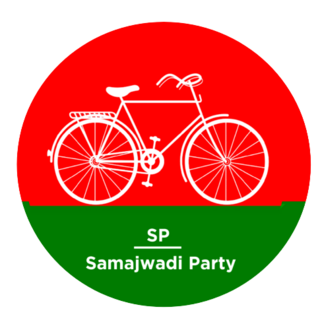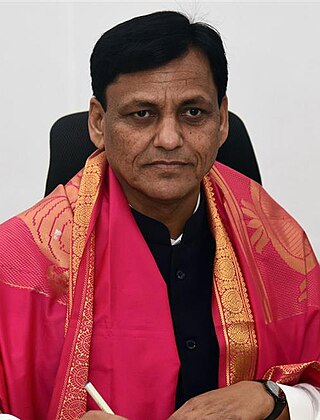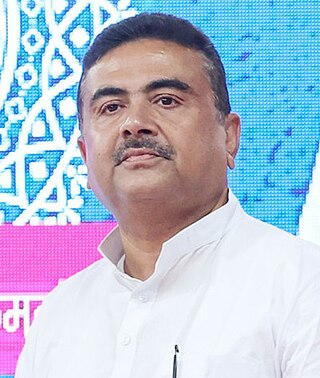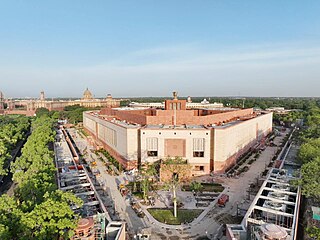External links
- ↑ The Indian Express (22 May 2019). "Lok Sabha elections results 2019: Here is the full list of winners constituency-wise". Archived from the original on 18 September 2022. Retrieved 18 September 2022.
Chhatar Singh Darbar | |
|---|---|
| Member of Parliament, Lok Sabha | |
| In office 19 May 2019 –4 June 2024 | |
| Constituency | Dhar |
| Personal details | |
| Born | 8 January 1954 Dhar,Madhya Pradesh |
| Political party | Bharatiya Janata Party |
| Spouse | Hemlata Singh Darbar |
| Children | 3 sons and 2 daughters |
| Residence | Dhar |
| Source: | |
Chhatar Singh Darbar (born 8 January 1954) is a member of the 17th Lok Sabha of India. He represents the Dhar constituency of Madhya Pradesh and is a member of the Bharatiya Janata Party (BJP) political party. [1]

The Samajwadi Party is a socialist political party in India. It was founded on 4 October 1992 by former Janata Dal politician Mulayam Singh Yadav and is headquartered in New Delhi. The Samajwadi Party is currently led by former Chief Minister of Uttar Pradesh, Akhilesh Yadav. As of 2024, it is currently the third-largest political party in India, and the largest party in Uttar Pradesh.

Ram Vilas Paswan was an Indian politician from Bihar and the Cabinet Minister of Consumer Affairs, Food and Public Distribution in the first and second Modi ministries. Paswan was also the president of the Lok Janshakti Party, nine-times Lok Sabha member and two-time Rajya Sabha MP. He started his political career as member of Samyukta Socialist Party and was elected to the Bihar Legislative Assembly in 1969. Later, Paswan joined Lok Dal upon its formation in 1974, and became its general secretary. He opposed the emergency, and was arrested during this period. He first entered the Lok Sabha in 1977, as a Janata Party member from Hajipur constituency, and was elected again in 1980, 1989, 1991, 1996, 1998, 1999, 2004 and 2014.

Bhagwant Singh Mann is an Indian politician, social worker, former comedian, singer and actor who is currently serving as the 17th Chief minister of Punjab since 2022. He represents the Dhuri Assembly constituency in the Punjab Legislative Assembly since 2022 and is also serving as the state convener of Aam Aadmi Party, Punjab since 2019. Previously, he was a member of the Lok Sabha from Sangrur Lok Sabha constituency from 2014 to 2022.

Nagaland Lok Sabha constituency is the only Lok Sabha constituency in the Northeastern state of Nagaland.
Lakshadweep Lok Sabha constituency is a Lok Sabha constituency, which covers the entire area of the Union Territory of Lakshadweep in India. This seat is reserved for Scheduled Tribes. As of 2014, it is the smallest Lok Sabha constituency in terms of electorate. Lakshadweep didn't have an elected Member of Parliament till 1967.

Adhir Ranjan Chowdhury is an Indian politician who served as the leader of the Indian National Congress in the 17th Lok Sabha and from 2019 to 2024 and the Member of Parliament from Berhampore from 1999 to 2024. He has served as the president of West Bengal Pradesh Congress Committee (WBPCC) following the demise of Somendra Nath Mitra from 2020 to 2024. and previously from 2014 to 2018, Chairperson of Public Accounts Committee since 2019, Minister of State of Railways from 2012 to 2014 and the member of the West Bengal Legislative Assembly from 1996 to 1999.

Mohammed Salim is an Indian politician, who is the incumbent State Secretary in West Bengal of the Communist Party of India (Marxist). He was inducted in the politburo of CPI(M) in the 21st party congress organised at Visakhapatnam in 2015. He was a Member of the 16th Lok Sabha, representing Raiganj constituency. Earlier, he was a member of the 14th Lok Sabha, representing the Calcutta North East constituency of West Bengal. After delimitation, in the 2009 Lok Sabha election Salim contested the new Calcutta North constituency, and lost to Sudip Bandyopadhyay of the Trinamool Congress. Mohammed Salim is contesting the 2024 Indian general election as the Left Front candidate from the Murshidabad.

Virendra Kumar Khatik is an Indian politician serving as the 29th Minister of Social Justice and Empowerment since 2024. He is a Member of Parliament in the 17th Lok Sabha from Tikamgarh.

Vadodara is one of the 26 Lok Sabha constituencies in Gujarat, a state in Western India. This constituency covers 7 out of 10 Vidhan Sabha constituencies of Vadodara district and first held elections in 1957 as Baroda Lok Sabha constituency in erstwhile Bombay State. It has been known as Vadodara since the 2009 elections. Its first member of parliament (MP) was Fatehsinghrao Gaekwad of the Indian National Congress (INC) who was also re-elected in the next elections in 1962. He was the Maharaja of Baroda of the Gaekwad dynasty at the time. P. C. Patel of the Swatantra Party won the election in 1967. From 1971–80, Gaekwad was MP of this constituency again firstly as a member of the Indian National Congress (Organisation) and then as a member of the INC. His younger brother, Ranjitsinh Pratapsinh Gaekwad also of the INC represented the constituency from 1980–89 for two terms before being defeated by Prakash Brahmbhatt of the Janata Dal party in the 1989 election.

Amethi is one of the 80 Lok Sabha constituencies in the Indian state of Uttar Pradesh. This constituency covers the entire Amethi district and was created in 1967. Like its neighbouring constituency Rae Bareli, it is considered to be a bastion of the Indian National Congress. Its first member of parliament (MP) was Vidya Dhar Bajpai of the Indian National Congress (INC) who was elected in 1967 and held his seat in the next election in 1971. In the 1977 election, Ravindra Pratap Singh of the Janata Party became its MP. Singh was defeated in 1980 by Sanjay Gandhi of the INC. Later the same year, Gandhi died in a plane crash. This forced a by election in 1981 which was won by his brother, Rajiv Gandhi. Gandhi went on to represent this constituency until 1991, when he was assassinated by the Liberation Tigers of Tamil Eelam (LTTE). The subsequent by election held the same year was won by Satish Sharma of the INC. Sharma was re-elected in 1996. Sanjaya Sinh of the Bharatiya Janata Party (BJP) defeated Sharma in the 1998 election. The widow of Rajiv Gandhi, Sonia Gandhi represented this constituency from 1999 to 2004. Her son, Rahul Gandhi, was elected in 2004. He was the fourth MP from the Nehru–Gandhi family since 1980 to represent the seat. Gandhi held the seat till the 2019 election when he was defeated by a margin of 55,000 votes by the BJP's Smriti Irani. Irani was defeated in 2024 by a margin of over 1.67 lakh votes by Kishori Lal Sharma of the Indian National Congress.

Kaiserganj Lok Sabha constituency is one of the 80 Lok Sabha (parliamentary) constituencies in Uttar Pradesh state in northern India.
Domariyaganj is one of the 80 Lok Sabha (parliamentary) constituencies in the Indian state of Uttar Pradesh. This constituency covers the entire Siddharthnagar district.

Darbhanga Lok Sabha constituency is one of the 40 Lok Sabha (parliamentary) constituencies in Bihar state in eastern India. Currently Gopal Jee Thakur of Bhartiya Janta Party is the Member of Parliament from Darbhanga Loksabha. In 2024 Indian general election, Gopal Jee Thakur won from this constituency.

Bangalore North Lok Sabha constituency is one of the 28 Lok Sabha constituencies in the South Indian state of Karnataka. This constituency has been known by different names in its history. For the 1951 and every election since 1977 it has been known as Bangalore North. For the 1957 and 1962 elections it was known as Bangalore City. For the 1967 and 1971 elections it formed a constituency jointly with Bangalore South and was known as Bangalore. From 1951–73, this constituency resided in Mysore State. On 1 November 1973, Mysuru State was renamed as Karnataka.

Ujiyarpur is one of the 40 Lok Sabha (parliamentary) constituencies in Bihar state in eastern India. This constituency came into existence in 2008, following delimitation of the parliamentary constituencies based on the recommendations of the Delimitation Commission of India. All the six assembly constituency which constitute Ujiarpur Lok Sabha constituency are dominated by Kushwahas and Yadavs equally.

Suvendu Adhikari is an Indian politician from Bharatiya Janata Party who is the current Leader of the Opposition in the West Bengal Legislative Assembly since 2021 and a member of the West Bengal Legislative Assembly from Nandigram Assembly constituency since 2021 and from Contai South from 2006 to 2009.

Ajay Tamta is a politician from Uttarakhand, India. He represents Bharatiya Janata Party serving as a Minister of State in the Ministry of Road Transport and Highways. He had also served as Minister of State for Textiles and is Member of Parliament (MP) from Almora constituency.

Subhash Ramrao Bhamre is an Indian politician and reelected in 17th Lok Sabha. He was a member of the 16th Lok Sabha. He represents the Dhule constituency of Maharashtra and is a member of the Bharatiya Janata Party (BJP) political party. His mother Gojarbai Ramrao Bhamre was an MLA and a member of the Indian National Congress.

A Member of Parliament in the Lok Sabha is the representative of a legislative constituency in the Lok Sabha; the lower house of the Parliament of India. Members of parliament of Lok Sabha are chosen by direct elections on the basis of the adult suffrage. The maximum permitted strength of members of parliament in the Lok Sabha is 550. This includes the maximum 530 members to represent the constituencies and states and up to 20 members to represent the union territories. Between 1952 and January 25, 2020, two seats were reserved for members of the Anglo-Indian community. The current elected strength of the Lok Sabha is 543. The party—or coalition of parties—having a majority in the Lok Sabha chooses the Prime Minister of India.

The 17th Lok Sabha was formed by the members elected in the 2019 Indian general election. Elections, all across India, were conducted in seven phases from 11 April 2019 to 19 May 2019 by the Election Commission of India. Counting started officially on the morning of 23 May 2019 and the results were declared on the same day.